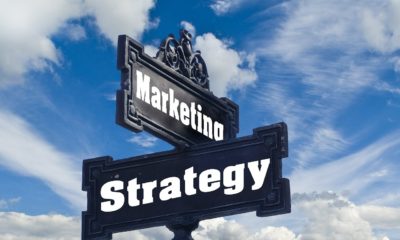Business
Three reasons B2B companies should invest in brand marketing
For purebred B2B companies, long-term thinking may remain quite a challenge due to pressure on delivering short-term sales. Field, however, believes that brand building is the perfect tool for driving growth and a marketer’s acquisition strategy should target broader audiences to garner long-term loyalty. The majority of B2B marketing often tends to be narrow and targets only existing customers.

The paradox of branding is that each marketer knows the brand should be the company’s core, but, many are unable to define it distinctly. Branding still originates from a company’s name and logo, but it has evolved into something dynamic and multifaceted.
Today, modern-day branding stands as a form of art that represents the overall identity of a company. Hence it craves personality to echo with the audience in a synchronized manner. However, brand marketing often gets overlooked as many are focused on short-term goals alone.
This should not be the case for you. Sustaining long-term goals like building a brand can impact an entire business when used adequately. Thus, it can be highly advantageous and worth the investment.
With that said, here are 3 reasons why B2B brands should start investing in brand marketing.
The hybrid advantage
Research from Binet and Field recently unveiled in New York reveals that B2B brand building should account for, on average, 46 percent of marketing spend and the other 54 percent on lead generation with the conclusion that investment rises as a business grows and matures.
This is followed up by research via Marketing Week and The Marketing Practice that shows B2B brands that outperformed competitors are twice more likely to allot a budget of 60% or more to pursue long-term goals.
There are also instances of case studies from IPA’s awards databank, this includes BT Commercial Vehicles. They illustrate clear and emotional storytelling around assisting business customers by connecting people.

As Field states, few businesses have B2C and B2B divisions. These ‘hybrid’ companies have seemingly combined B2C learning with B2B effectively.
Insurer Direct Line is another company that ticks the hybrid box. Claire Sadler, head of the transformation says, Binet and Field affirm much of what she had felt – that reaching and tapping emotion through creative storytelling are equally important in B2B brands as they are for B2C businesses.
Technology has enabled buying business services much easier but it also means human interaction has been minimized. Sadler adds by saying how the face of insurance brands was the salesman. But today, insurers share the brand story through websites and B2B advertising.
Short-term pressures
For purebred B2B companies, long-term thinking may remain quite a challenge due to pressure on delivering short-term sales. Field, however, believes that brand building is the perfect tool for driving growth and a marketer’s acquisition strategy should target broader audiences to garner long-term loyalty. The majority of B2B marketing often tends to be narrow and targets only existing customers.
Research findings have gone well and B2B marketers accept brand building along with storytelling as essential for a business to remain competitive and continue growth.

Richard Robinson from DMA’s B2B Council says, creating long-term awareness is elemental to B2B companies as sales growth depends on fostering successful and loyal customer relationships. One area that requires change is, B2B marketers have to be more confident in communicating their stories and making a difference.

Exabeams CMO and author of The Professional Marketer, Tim Matthews has built several B2B marketing teams, this includes leading 9 worldwide product launches at Symantec, a security product brand.
Matthews states, people, purchase from people, hence, any B2B brand must find a narrative. With an origin story onboard surrounding the founder, future buyers are able to connect more with the brand.
The lost opportunity
CMO of OpenJaw Technologies, a travel retailing platform, Colin Lewis says, in the past B2B marketing was considered the ugly one internally. These were the ones that organized clients with product photoshoots and golf days.
But now the internet has influenced change as can be seen on how leads are generated, states Lewis. Big B2B brands like Microsoft, IBM, or Intel were always in need of a proper evolving brand story as they operate within a dynamic market. However, for others, getting sales function to buy the importance of long-term brand building can be challenging.

FleishmanHillard Fishburn, a communications agency carried its research on the effect a brand has on B2B sales and marketing. The study revealed 32% of people ranked brand reputation as the key factor they want in a supplier as well as buyers wanting to work with reputed industry expert brands.
Claudia Bate, their head of technology says, Modern B2B marketing must appeal to the heart and mind. The important decision-makers never leave one’s emotion and personality at their door when leaving for work. Creative storytelling, content, and distinct brand identity are important tools to initiate real business value.
Conclusion
Brand marketing initially began to serve the needs of labeling products for consumer awareness. Today, the role remains similar but the overall goal has shifted as customer preferences evolve and new forms of communication develop.
As the brand marketing rulebook continues to adapt and rewrite itself, you don’t want to get left behind, so, implement effective and consistent strategies for your company.
—
(Featured image by Carl Heyerdahl via Unsplash)
DISCLAIMER: This article was written by a third party contributor and does not reflect the opinion of Born2Invest, its management, staff or its associates. Please review our disclaimer for more information.
This article may include forward-looking statements. These forward-looking statements generally are identified by the words “believe,” “project,” “estimate,” “become,” “plan,” “will,” and similar expressions. These forward-looking statements involve known and unknown risks as well as uncertainties, including those discussed in the following cautionary statements and elsewhere in this article and on this site. Although the Company may believe that its expectations are based on reasonable assumptions, the actual results that the Company may achieve may differ materially from any forward-looking statements, which reflect the opinions of the management of the Company only as of the date hereof. Additionally, please make sure to read these important disclosures.

-

 Crowdfunding1 week ago
Crowdfunding1 week agoPMG Empowers Italian SMEs with Performance Marketing and Investor-Friendly Crowdfunding
-

 Markets5 days ago
Markets5 days agoMarkets Wobble After Highs as Tariffs Rise and Commodities Soar
-

 Markets2 weeks ago
Markets2 weeks agoThe Big Beautiful Bill: Market Highs Mask Debt and Divergence
-

 Africa2 days ago
Africa2 days agoORA Technologies Secures $7.5M from Local Investors, Boosting Morocco’s Tech Independence

























